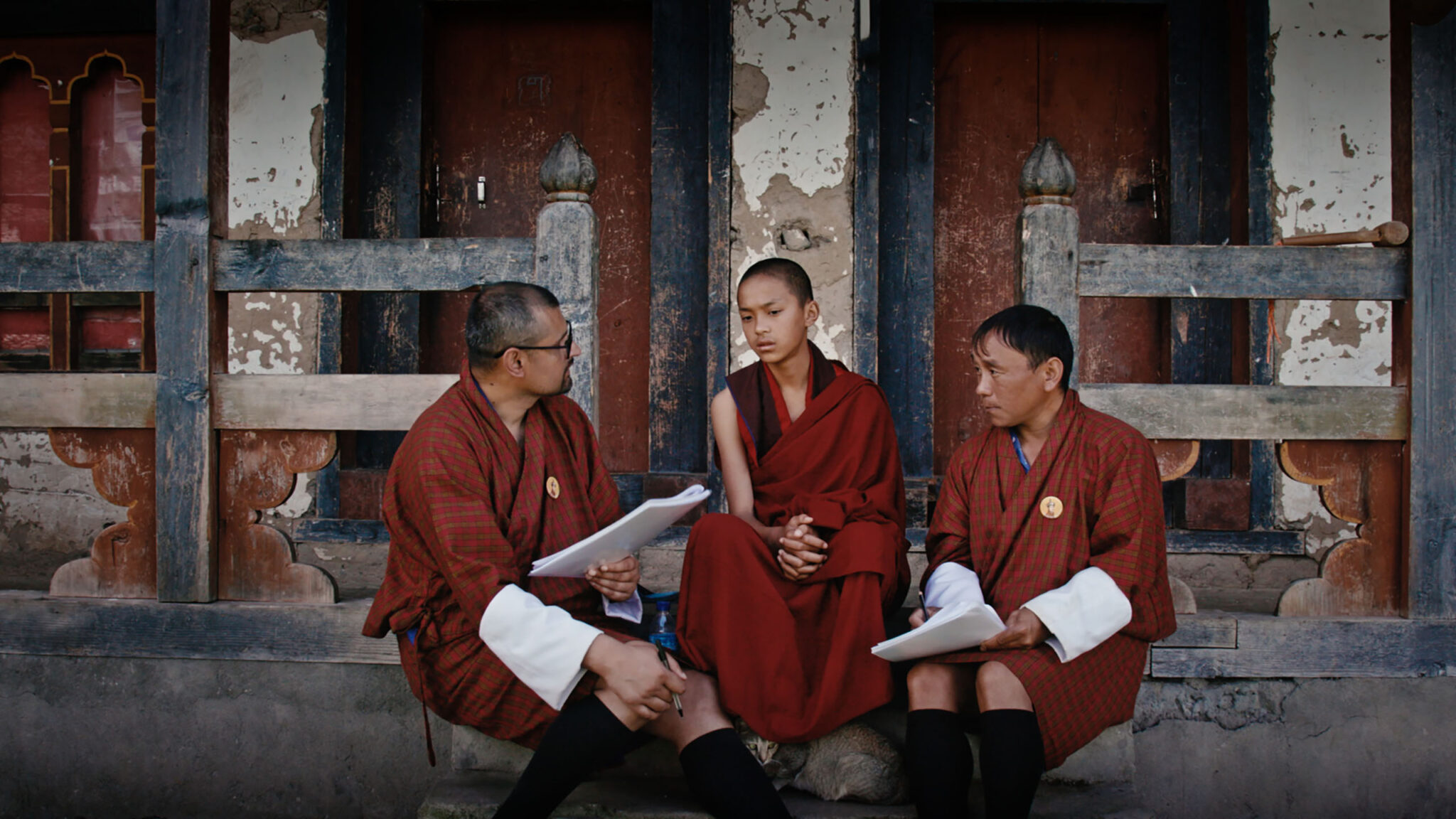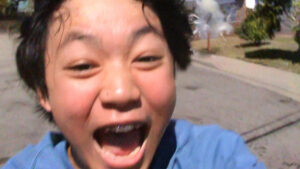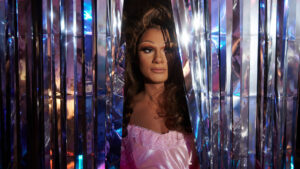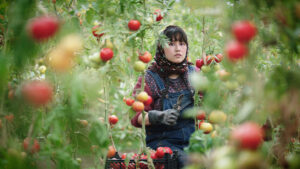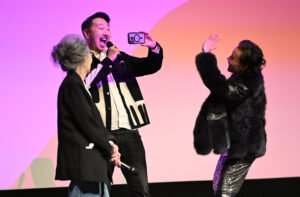By Lucy Spicer
One of the most exciting things about the Sundance Film Festival is having a front-row seat for the bright future of independent filmmaking. While we can learn a lot about the filmmakers from the 2024 Sundance Film Festival through the art that these storytellers share with us, there’s always more we can learn about them as people. This year, we decided to get to the bottom of those artistic wells with our ongoing series: Give Me the Backstory!
Co-directors Arun Bhattarai and Dorottya Zurbó met the protagonist of their film Agent of Happiness, which premiered in the World Cinema Documentary Competition at the 2024 Sundance Film Festival, quite by chance. In fact, they were in the process of filming a different project altogether. “A few years ago while making The Next Guardian, we had an accidental encounter with two happiness surveyors who walked into the house of our characters. One of the agents was Amber,” recounts Bhattarai. “While witnessing him for the first time, we were immediately drawn toward him because of his childlike humor and warm personality. We couldn’t help but stay in touch.”
Amber is an agent whose job is to survey the level of people’s happiness in order to measure the Gross National Happiness index for the government in Bhutan. “We were inspired by this concept and wanted to look behind the happiness index statistics and focus on the people and see what can and can not be measured in life,” explains Zurbó. “Due to its isolation, Bhutan is often exoticized by Western media as the last Shangri-La, a hidden Buddhist kingdom where everyone is happy. Our intention was to dig deeper and get a local insight into GNH through personal stories in order to show the audience a more complex vision about it.”
Agent of Happiness follows Amber as he listens to people from varying lifestyles discuss the ways in which they find contentment. Along the way, Bhattarai and Zurbó see Amber reflect on his own loneliness and personal search for happiness. Read on to gain more insight into the documentary and its co-directors, including how Bhattarai and Zurbó fell in love with cinema and their favorite part of making Agent of Happiness.
Why does this story need to be told now?
In our fast-paced, desire-driven, consumerist world, this film can inspire us to appreciate life with more modesty, to take the everyday struggle with ease, to value our close relationships or the time we spend together — things that we often forget. We hope, through the personal stories of our protagonists, this film can talk to anybody, reaching a wide range of audiences regardless of age, race, nation, and gender, because the film is about a basic human desire — how to be happy. Agent of Happiness is a bittersweet tale that takes place in an environment that is still enigmatic and untouched, disguised from the eyes of a wider world. In times of global crises and wars that are scrambling the world right now, we believe it is also important to produce stories with uplifting, heartwarming potential to give hope. We feel this is one of our responsibilities as artists.
Films are lasting artistic legacies; what do you want yours to say?
Our film is a mosaic of different stories reflecting the themes of happiness and sorrow. We feel it can touch the different sensitivities of the audience. However, what binds these stories together is what we also want our film to say: No matter which part of the world we belong to, we need one another. The characters in our film, in the face of adversity, find hope in caring for their loved ones. Through themes like spirituality, acceptance of fate, and unconditional love for family, we experience that our happiness is determined by our ability to wait in the face of sorrow. The characters in the film teach that through acceptance, you don’t suffer from your sadness. Similarly, even in joy, you don’t need to crave more of it. Contentment comes from shedding the constant need for more.
Your favorite part of making the film? Memories from the process?
Our favorite part of making this film was traveling from door to door through different parts of Bhutan with Amber, the main character. The encounters were always spontaneous and unexpected. During the filming process, we saw that there is a similarity between Amber’s job as a happiness agent listening to people’s stories and our profession as filmmakers. He was an extension of our own inquiries into the search for happiness.
What was a big challenge you faced while making this film?
Arun Bhattarai: Because it is a multicharacter film, it was very difficult to build the narrative structure and find the best possible way to tell the story. This is the most challenging film that Dorottya and I have worked on because we had to build in many stories that resonate with one another inside this mosaic.
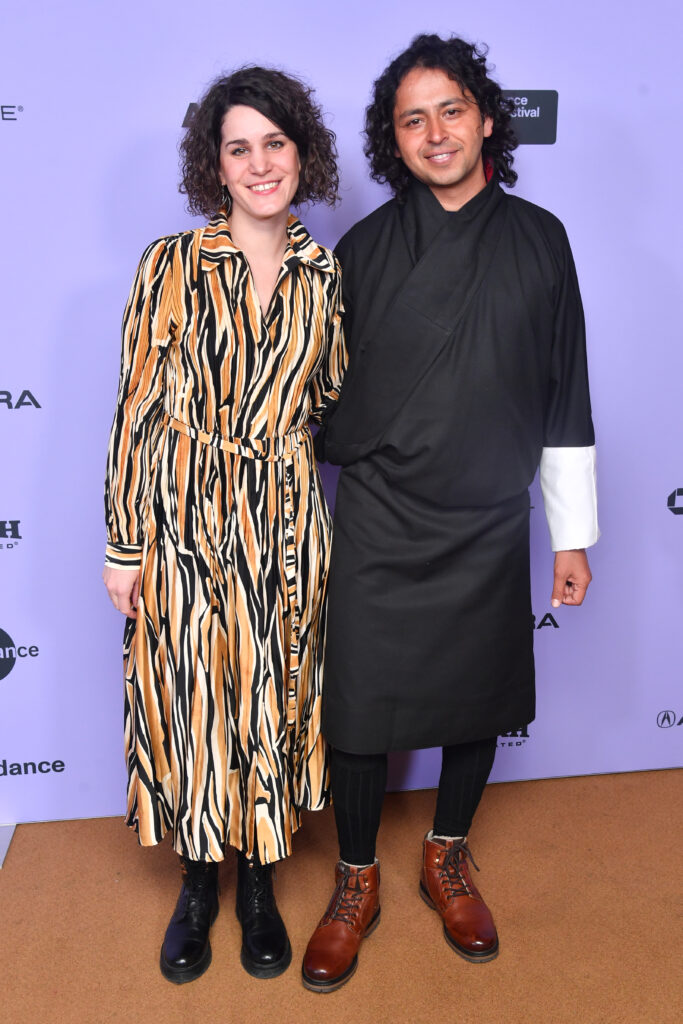
Dorottya Zurbó: It is very challenging to make a film in Bhutan. We were co-directing it 8,000 km away from one another. Bhutan is a closed country; the tourist visa costs $250 USD/day. So it was quite difficult for me to get into Bhutan. Arun could invite me every half year for a month when we tried to record the most important scenes for the film. Otherwise he was continuously following our characters and shooting the film, while I was editing the material back in Budapest. We were constantly talking through video calls and sending the newly recorded materials and edited sequences to each other and discussing what to shoot next and how to develop the story.
Tell us why and how you got into filmmaking.
Bhattarai: Growing up, cinema was always an unknown, magical realm that was hard to reach. Bhutan didn’t have television until 1998, because of which I didn’t really have access to the audiovisual medium during my youth. When I really did get access to them, I was naturally fascinated by them and have always wanted to make them. That’s how I started to work in the only television station in the country. After working for a few years there, I felt the need to tell more intimate, personal stories. I got selected into the DocNomads masters program in Europe, where I actually discovered creative documentaries and found my own calling.
Zurbó: I have loved cinema since my childhood. After high school, I studied film theory and history for six years. During university I discovered the genre of documentary. I made my very first documentary with children living in foster care in Hungary. The experience of letting me into their lives and sharing their innermost feelings while we created a film together affected me deeply. After this experience, I only wanted to make documentaries to connect with people through the camera and create something together that can touch audiences and take them into worlds they have never experienced.
What three things do you always have in your refrigerator?
Bhattarai: Cheese, chili, and yogurt
Zurbó: Cheese, olives, and yogurt
What was the last book you read?
Bhattarai: Second Place by Rachel Cusk
Zurbó: Honour by Elif Shafak
Tell us about your history with Sundance Institute. When was the first time you engaged with us? Why did you want your film to premiere with us?
We received a development grant from Sundance Institute in 2020 to work on our film. They were one of the first supporters that believed in our story. It was always our dream to premiere our film at Sundance; we feel very honored. It is the first Bhutanese-Hungarian co-production and first Bhutanese film premiering at the Festival.
What’s your favorite film that has come from the Sundance Institute or Festival?
Bhattarai: Werner Herzog’s Grizzly Man, one of the films that opened my eyes to the possibilities of documentary filmmaking.
Zurbó: A Love Song by Max Walker-Silverman, one of the most beautiful films I’ve seen about the eternal human condition of searching for love, no matter of age, with an amazing stylistic minimalism and a touch of absurdity.




